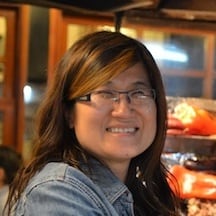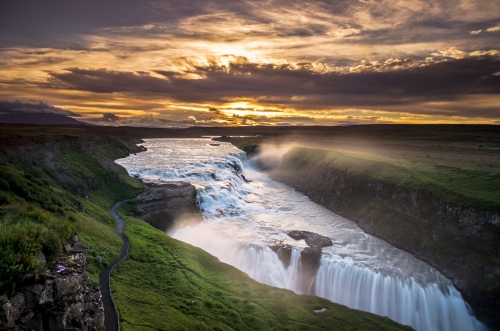
Among the world’s most beautiful and remote places, Iceland ranks high. It’s a country where spring water flows directly to homes, offices and hotels. A destination to visit for a breath of fresh air, where the wilderness is less than an hours drive. Outside Reykjavik, Iceland’s largest and most populated city, the population is sparse. The untouched natural wonders look like an alien world to city-dwellers like my family and I. To get a taste of its natural beauty, we joined Iceland’s most famous guided tour: the Golden Circle. Departing from Reykjavik in the morning, the temperature-controlled tour bus followed the well-paved Ring Road to the east of the island. We visited famous sites and natural wonders including Pingvellir National Park, Gullfoss Waterfall, Geysir Geothermal area, Strokkur, farmlands, Skalholt church and Hellisheidi Geothermal Power Station. The first part of the route offered views of green-grey lava fields with hot steam seeping through the grounds. As the bus wound its way towards Lake Thingvallavatn, I found myself feeling as if I were in one of the scenes in The Secret Life of Walter Mitty. You would have too if you had visited four of these famous sites in Iceland:
Thingvellir National Park (Þingvellir National Park)
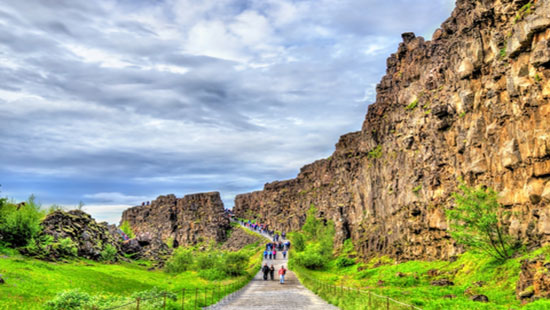
Thingvellir National Park is the location and birthplace of the Alþingi. The Alþingi was established in 930AD and is the first and the oldest running parliament. Listed as a UNESCO World Heritage Site, Thingvellir is Iceland’s most important historical treasure. In the Icelandic language, Þingvellir means the “valley of meeting”. The Logberg, Law Rock, was the focal point of the Alþingi (parliament). This scenic park is home to Iceland’s largest natural lake and is the place where the tectonic plates of North America and Eurasia split and drift apart. That means Iceland is geologically located in both the North America and Europe. We learned about the geology, history and culture of Iceland at Thingvellir.
Gullfoss (Golden) Waterfall
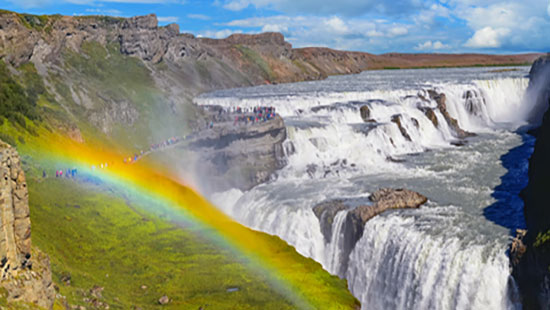
Gullfoss Waterfall flows in two stages before plummeting into the rugged canyon. The first stage is 36 feet (11 metres) and the second stage is 65 feet (20 metres). We were allowed to walk to the waterfall and hear the thunderous sound and feel the mist from the strong impact of the fall as the water hit the canyon.
Geysir Geothermal Field Strokkur
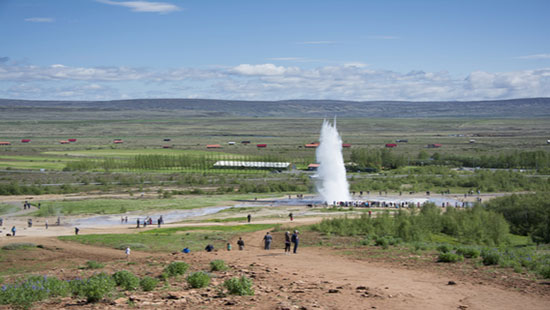
Also known as The Churn, is the most active geyser in the Geysir geothermal field. Instead of crowding around Strokkur and waiting for it to erupt, we thought we'd give The Great Geysir some time to work its magic. We stood and waited for over 15 minutes but nothing happened, while Strokkur erupted at least three times while a huge crowd watched. It ejected steam, gas and hot water as high as 100 feet in the air, but most eruptions average at around 60 feet. The Geysir geothermal field was filled with bubbling mud pools, colourful algae, mineral deposits and hot steam oozing out from the ground.
Skalholt Church
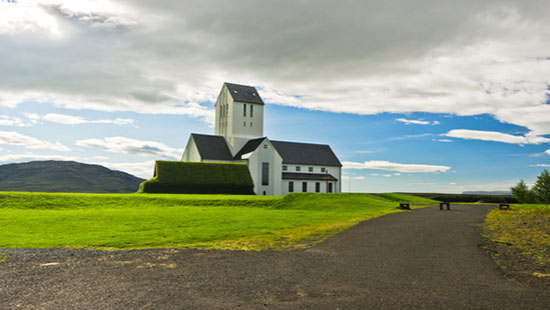
Surrounded by farmland, Skalholt Church is one of the most important historical and sacred places in Iceland. It has over 800 years of religious and political history, from the 11th century to the end of the 18th century. The original wooden church was destroyed. The current church was built in the 1950s. We learned that Iceland’s first school was founded in Skalholt. Hellisheiðarvirkjun Geothermal Power plant at the foot of Mt. Hengill volcano was the last stop on the Golden Circle tour. Here, instead of visiting the Geothermal Energy Exhibition, we stopped for coffee and cakes. This is the world’s third largest geothermal power plant and is located 15 miles from Reykjavik. Lava fields were the main landscape for the remaining part of the journey back to Reykjavik.
The guided tour was filled with important sites to visit but what really stood out were three things: the Icelandic stories told by the professional tour guide, the recommended places to buy books and coffee shops to visit. Reykjavik has plenty of coffee shops. In fact, there is at-least one on each street corner of the city. Here are three among the few suggested by the Golden Circle tour guide:
Eymundsson Bookstores
Besides the coffee shop located inside the Hellisheiðarvirkjun Geothermal Power plant, the tour guide recommended having coffee at one of the Eymundsson bookstores in Reykjavik. We visited one at Austurstræti 18, located in the older part of Reykjavik. Here you can have decent coffee and a chance to pick up a few English books like The Sagas of Icelanders.
Tiu Dropar
If you are shopping on Laugavegur Street, stop by Tiu Dropar for coffee and Belgian waffles or traditional Icelandic cake. Located in a basement with a side entrance on the busy shopping street, Tiu Dropar is a coffee shop during the day and a bar in the evening. This place reminded me of my neighbour’s house in New Zealand, where teapots were used as decor in her kitchen.
Mokka Kaffi
Another place to get your coffee fix is Mokka Kaffi, located close to Hallgrimskirkja church. Step back in time to the 1950s and enjoy your favourite cup of coffee in one of the oldest coffee shops in Reykjavik. Mokka Kaffi was the first coffee shop to install an espresso machine in the city.
